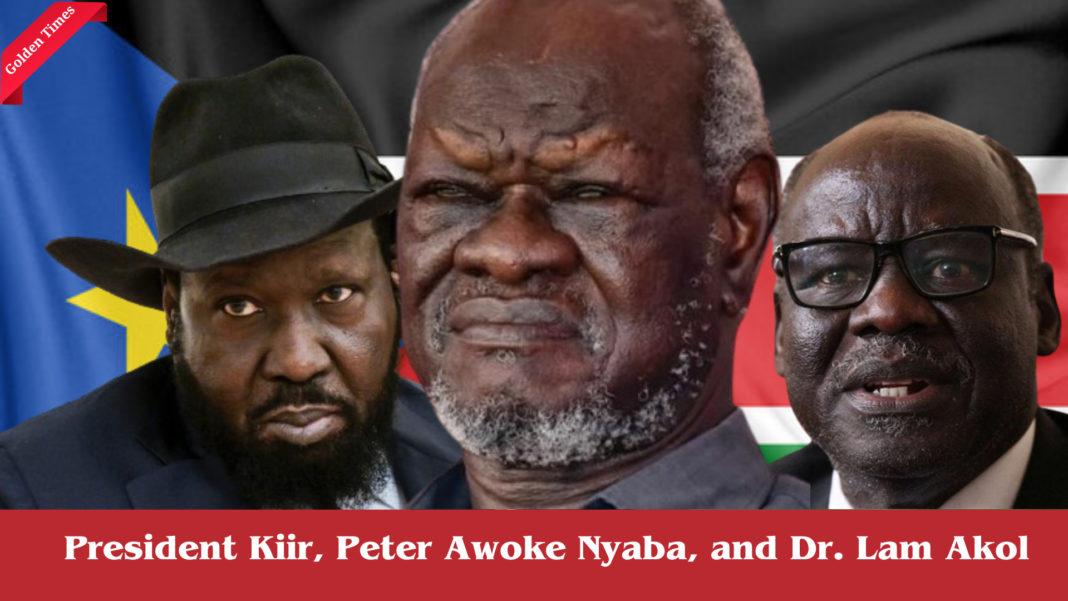Well-known veteran politician, Peter Adwok Nyaba criticized the peace agreement signed between the government and parties to the conflict in 2018, describing it as a ‘bogus’ peace agreement, failing to address the underlying causes of the 2013 bloody conflict.
Nyaba stated this while addressing a forum organized by a group of civil society organizations in the country’s national capital Juba on March 21.
He seized the opportunity to break his silence on the fate of the revitalized peace agreement, saying it is a sham peace agreement.
“This thing called revitalized agreement is just a ‘sham.’ It did not address the problem of war, [for instance], why people fight on the 15th of December 2013?” Nyaba Wondered.
Nyaba’s latest position aligns with that of the holdout group who abstained from signing the peace deal dubbed as R-ARCSS [ Revitalized Agreement on the Resolution of Conflict in the Republic of South Sudan 2018]. The holdout group designated the R-ARCSS as a “betrayal to the people of South Sudan.”
Six years passed by, and the implementation of the R-ARCSS lugs was behind schedule causing concerns from the international community and peace guarantors.
The parties to the agreement could not agree on some critical chapters of the agreement such as the transitional justice system, permanent constitution, security arrangements, and funding of the electoral institutions tasked to prepare the people for their first-ever general election.
Besides these, several critical tasks remain unimplemented, and critical bodies, such as the Political Parties Council (PPC), the National Elections Commission (NEC), and the National Constitutional Review Commission (NCRC), remain unfunded with no clear timelines on the way forward.
Reconstituted Joint Monitoring and Evaluation Commission [R-JMEC], demands clarity from the Revitalised Transitional Government of National Unity (RTGoNU) on how it is planning to expedite and complete the critical pending tasks necessary to conduct free, fair, and credible elections in December 2024.
In the past week, the Chairperson of the R-JMEC Charles Tai Gituai has been engaging the key stakeholders, institutions, and mechanisms of the R-ARCSS, and he found out that, there was a need for clear and actionable political guidance from the Executive of the R-TGoNU and the Parties to the Agreement, without the loss of any more critical time and momentum.
As such, urgent dialogue of the Parties to the R-ARCSS is the most expedient way to address the current political situation.
The current political spat was triggered by the quest for a credible, free, and fair election and a peaceful democratic transition which could bring to an end years of transitional governance system.
The ruling party, SPLM [Sudan People’s Liberation Movement], argued that elections could be conducted even without a permanent constitution, census, and other critical institutions necessary for a ‘world-class’ election.
However, the main opposition group dubbed SPLM-IO [Sudan People’s Liberation Movement In-Opposition] lamented that the country is not prepared to hold free, fair, and credible elections this year.
The opposition group argued that the election would not be possible this year due to intransigence and lack of political will by the government of national unity led by President Salva Kiir Mayardit.
R-JMEC says it was clear that the way forward on elections depends on the Parties meeting and engaging in dialogue openly and constructively, in the spirit of collegiality and consensus.
Opposition Leader Lam Akol Ajawein told Golden Times that the parties that signed the 2018 R-ARCSS have failed to build trust and engrain dialogue as a culture of conflict resolution.
Akol said the only solution to deliver the people of South Sudan from this horrendous political discourse is dialogue, the point the Chairperson of R-JMEC Charles Tai Gituai has been stressing.
“The point I would like to stress is that the missing link which is the dialogue is the only thing that will deliver South Sudan from this ‘quagmire’ that we are in and the dilemma facing the elide mainly of whether it is possible to hold the election or not,” Akol said.
He said from 2005 up to today, South Sudan has been ruled under the transitional governance system, saying the people of South Sudan longed for a democratic system.
“The parties have failed to build trust, to promote reconciliation, and to engrain dialogue as a culture in South Sudan,” Akol said.
As for Nyaba, the peace deal was not implemented deliberately because of fear of losing power.
“We have parties that signed the agreement and they have not implemented it, why? The reason is simple, those who have the power want to keep the power. The SPLM was not a political party, it was a military organization. There is no democracy. We never had elections during our time in the bush,” Nyaba lashed out.
“The dialogue will be okay. We can leave him […] there but let him develop the country or let him allow the formation of the government that can work and develop the country,” he concluded.
The Anglican Archbishop Justin Badi Arama expressed displeasure over the lack of clarity and consensus among political parties on whether the elections will be conducted in December 2024 or not.
Archbishop Badi said the political discourse worries the general public, urging the parties to address the contentious issues peacefully.




